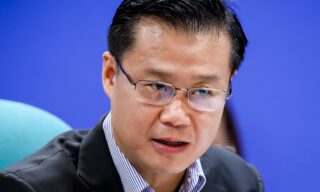Despite an alarming start in the ongoing 16th Asian Games in Guangzhou, China, the Amateur Boxing Association of the Philippines remains on track to uphold its reputation as one of the most productive national sports associations in terms of medals won.
Old-timers still fondly remember when the nation’s boxing simonpures lorded it over Asia, specially during the time when Abap was headed by the late business leader and sportsman Eugenio J. Puyat, whose boxers amassed three gold medals in three successive Asian Games.
The Asiad gold medal winners were:
1) Welterweight Manfredo Alipala (4th Asian Games, Jakarta, 1962).
2) Lightweight Rodolfo Arpon (5th Asian Games, Bangkok, 1966).
3) Bantamweight Ricardo Fortaleza (6th Asian Games, Bangkok 1970).
All three fighters were mainstays of the powerhouse Far Eastern University team, trained by the legendary coach Celestino “Aling” Enriquez and supported by FEU’s sports-minded brothers, Noring and Ding Reyes.
Overall, Puyat’s boxers garnered three golds, two silvers and 10 bronzes, one gold medal behind the 4-2-9 slate posted by the father-and-son tandem of former Philippine Sports Commission chair and Manila Mayor Mel Lopez and his son, Manny.
Known as Tito Gene to his friends and admirers, Puyat highlighted his fruitful career in the Abap when featherweight Anthony Villanueva won the silver medal during the 1964 Tokyo Games, the Philippines’ first silver in the Olympics since 1924 when the country first took part in the Asiad.
That silver was duplicated 32 years later during the 1996 Atlanta Centennial Games by light flyweight Mansueto “Onyok” Velasco when Abap was under Manny Lopez.
Puyat served as first Abap president in 1961 and amateur boxing flourished since then. He resigned three times as association president—1964, 1970 and 1976, the last time after undergoing major surgeries.
However, his resignations were all rejected by the Abap board, then composed of sports luminaries such as treasurer Alfredo “Ding” Reyes of FEU, businessman-civic leader Benjardi Crame and longtime sportswriter Mario Roxas of the Associated Press.
“Gene Puyat never wanted to make the Abap his private preserve,” once said Roxas, who died last August of lung cancer. “If there were people who joined sports associations for personal gain, Mr. Puyat was not one of them. When death was near, one of his last instructions was for the Abap money he had saved, amounting to P192,548.04, to be turned over to whoever would succeed him.”
The amount was promptly delivered to his successor, former Makati Mayor Nemesio Yabut, through lawyer Rodrigo Salud, then the new Abap secretary.
One of the most active and successful NSA presidents of that period, Tito Gene was a workaholic, attending to his Abap duty without fail. He would leave his business in Manila for days or weeks, traveling abroad or to provinces at his own expense.
Eugenio J. Puyat died on May 20, 1980 at the age of 64.
The Asiad gold medal winners were:
1) Welterweight Manfredo Alipala (4th Asian Games, Jakarta, 1962).
2) Lightweight Rodolfo Arpon (5th Asian Games, Bangkok, 1966).
3) Bantamweight Ricardo Fortaleza (6th Asian Games, Bangkok 1970).
All three fighters were mainstays of the powerhouse Far Eastern University team, trained by the legendary coach Celestino “Aling” Enriquez and supported by FEU’s sports-minded brothers, Noring and Ding Reyes.
Overall, Puyat’s boxers garnered three golds, two silvers and 10 bronzes, one gold medal behind the 4-2-9 slate posted by the father-and-son tandem of former Philippine Sports Commission chair and Manila Mayor Mel Lopez and his son, Manny.
Known as Tito Gene to his friends and admirers, Puyat highlighted his fruitful career in the Abap when featherweight Anthony Villanueva won the silver medal during the 1964 Tokyo Games, the Philippines’ first silver in the Olympics since 1924 when the country first took part in the Asiad.
That silver was duplicated 32 years later during the 1996 Atlanta Centennial Games by light flyweight Mansueto “Onyok” Velasco when Abap was under Manny Lopez.
Puyat served as first Abap president in 1961 and amateur boxing flourished since then. He resigned three times as association president—1964, 1970 and 1976, the last time after undergoing major surgeries.
However, his resignations were all rejected by the Abap board, then composed of sports luminaries such as treasurer Alfredo “Ding” Reyes of FEU, businessman-civic leader Benjardi Crame and longtime sportswriter Mario Roxas of the Associated Press.
“Gene Puyat never wanted to make the Abap his private preserve,” once said Roxas, who died last August of lung cancer. “If there were people who joined sports associations for personal gain, Mr. Puyat was not one of them. When death was near, one of his last instructions was for the Abap money he had saved, amounting to P192,548.04, to be turned over to whoever would succeed him.”
The amount was promptly delivered to his successor, former Makati Mayor Nemesio Yabut, through lawyer Rodrigo Salud, then the new Abap secretary.
One of the most active and successful NSA presidents of that period, Tito Gene was a workaholic, attending to his Abap duty without fail. He would leave his business in Manila for days or weeks, traveling abroad or to provinces at his own expense.
Eugenio J. Puyat died on May 20, 1980 at the age of 64.
READ NEXT
Bulls nip Dolphins in 16th inning
MOST READ
LATEST STORIES





